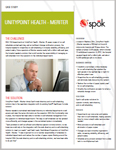Case studies
UnityPoint Health-Meriter
Overview
Located in Madison, Wis., UnityPoint Health – Meriter operates a 448-bed not-for-profit community hospital and 10 area clinics. The system employs 3,500 people, which includes 14 switchboard operators. In 2012, the hospital received nearly half a million calls, and about 15,000 additional calls to its clinics.
Industry
- Healthcare
Business drivers
- Establish a centralized, online database for on-call scheduling that enables the right people to be reached day or night for effective patient care
- Streamline the on-call scheduling process and eliminate daily data entry into the system
- Reduce the number of paper copies for on-call scheduling
- Simplify the notification process for when a schedule change occurs
Solution
- Console, web directory, and on-call scheduling
Results
- Departments can now enter and update their own on-call schedules, freeing operator time for more in-depth caller service when needed
- More accurate on-call schedules and elimination of paper copies
- Instant organization-wide changes, increasing reliability, efficiency, and patient safety
- Schedule entry process reduced from a daily task to monthly/annual task
The challenge
With 158 departments at UnityPoint Health – Meriter, 25 paper copies of on-call schedules printed each day, and an inefficient change notification process, the hospital needed to streamline on-call scheduling to increase reliability, efficiency, and patient safety. Since operators at Meriter receive nearly half a million calls each year, the hospital needed a solution that could transfer the responsibility of managing on-call schedules from the operators to the individual departments.
The solution
UnityPoint Health – Meriter chose Spok web directory and on-call scheduling solution due to the seamless integration with its existing Spok® Healthcare Console solution.
Meriter needed a centralized web-based directory so individual departments could access and view the same information as the operators. With this functionality now in place, the hospital has been able to transfer on-call schedule management from the operators to individual departments. This way on-call schedules can be updated more efficiently, and changes appear in the centralized system immediately.
“Spok provided us with an efficient and effective operator console solution, so we knew we could rely on the integration with the web directory and on-call scheduling solution to meet our needs,” said Heidi Lueck, Switchboard Supervisor at UnityPoint Health – Meriter. “It was important for us to transfer responsibility of schedules to individual departments and reduce the number of paper copies floating around the hospital. With the web directory and on-call scheduling solution, we have been able to do just that.”
It was important for us to transfer the responsibility of schedules to individual departments and reduce the number of paper copies floating around the hospital. With the web directory and on-call scheduling solution, we have been able to do just that.
– Heidi Lueck, Switchboard Supervisor
The result
UnityPoint Health – Meriter saw the benefits of using the Spok web directory and on-call scheduling solution soon after implementation. Previously, operators had to log out of the Spok Healthcare Console and log into a separate computer to access on-call schedules, print out copies, and deliver the copies to each floor. This reduced the operators’ call-taking capacity and wasted time that should have been devoted to customer service and code calls.
With the Spok web directory and on-call scheduling solution, on-call schedule entry went from a daily task to a monthly or even annual one. Daily paper copies have been reduced from 25 to one, and the time devoted to on-call schedules has been reduced from two to three hours each day to less than one. Since individual departments can now access a centralized database and change on-call schedules, operators now have more time to spend handling inbound calls.
The Spok solution has also improved the accuracy of on-call schedules as well as the change notification process because the steps are less manual. This is because rather than operators having to individually call each area of the hospital to notify them of schedule changes, the changes are seen instantly organization-wide on the web-based system.



